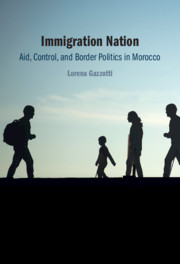Acknowledgements
In her book Complaint!, feminist scholar Sara Ahmed argues that “Power works by making it hard to challenge how power works”. In expansive border regimes, power thickens and contracts, it encircles some, it is oblivious of others. Understanding its workings would have been impossible without the generous availability of my interviewees, who kindly offered their time to answer my questions and, more than once, to put me in touch with additional respondents. I will be always grateful for this support.
This book has seen the light thanks to the mentoring and friendship of many great women. Alexandra Winkels had the onerous task of supervising the thesis this book builds on. She did it so graciously – which was not easy, given how overexcited and overconfused a PhD student I was! Mercedes Jiménez has shown an incredible enthusiasm for this project all along. Her generous mentoring, her knowledge of the Strait, and her commitment to social justice are a constant source of inspiration. Maria Hagan has been an unbeatable fieldwork partner during my last field visit. We shared interviews, reflections, laughs, and a twelve-hour bus ride from Agadir to Rabat via Marrakech that we both kind of regret. Leslie Gross-Wyrtzen, Niyousha Bastani, Katharina Natter, Melissa Mouthaan, Melissa Gatter, Cynthia Magallanes Gonzales, Anissa Maâ, Ruth Lawlor, Georgia Cole, Noura Wahby, and Pascaline Chappart also provided feedback on various draft chapters that brought the manuscript to the next level. Sigrid Lupieri volunteered to proofread more of my Southern European English than anyone should ever be obliged to. Francesca Tabloni, Fatima Fernandéz, and Vanessa Tullo have also opened the door of their houses in Casablanca and Rabat to me whenever I needed it, and I cannot express my gratitude enough.
This book is also the product of the support of many great men. Graham Denyer Willis has been everything a mentor should be – constantly encouraging me to do better, think bigger, and think with others. Mehdi Alioua, Nouri Rupert, and Hicham Jamid offered feedback and encouraging support on my early thoughts while this project was still at the fieldwork stage. Michael Collyer was such a good examiner, providing incisive comments while also showing genuine interest in learning from my findings. Gerasimos Tsourapas, Felix Anderl, Matt Mahmoudi, Hassan Ould Oumar, Jo Brandim Howson, and Ted Tregear also provided feedback and reading suggestions on my chapters at different stages.
I wrote a book about elusive power while precariously working in a sector – UK Higher Education – where domination works through camouflage – badly paid teaching jobs are branded as incredible ‘opportunities’ and taking on additional unpaid work is qualified as a sign of good ‘departmental citizenship’. At Cambridge, though, I have found a community of trade union organisers that taught me some terrific lessons about resistance in the face of elusive power. Thanks to Stephanie Mawson, Ted Tregear, Ruth Lawlor, Sandra Cortijo, Rasha Rezk, Torkel Loman, Sue Hakenbeck, Michael Abberton, Lydia Richards, and everyone else at the Cambridge branch of the University and College Union for showing me how to resist and teaching me about the importance of building workers’ power from the bottom up.
The research for this book counted on the financial support of the Cambridge Trust, the MariaMarina Foundation, Lucy Cavendish College, the Department of Politics and International Studies at the University of Cambridge, the Centre Jacques Berque pour les Etudes en Sciences Sociales, and the Society for Libyan Studies. I am also thankful to three anonymous reviewers for very helpful feedback on the manuscript, to Maria Marsh and Atifa Jiwa at Cambridge University Press for accompanying me though the editorial process, to Angela Valente for her superhuman patience in the copy-editing stage, and to Philip Stickler for creating the maps that figure in this book.
I finished writing this book in the midst of a global pandemic. It’s not easy to support someone at a distance. I am so grateful my family tried and managed to do this in such challenging times. Raffaele Danna, Enrico Daviddi, Ben Jackson, Selina Zhung, Alex Waghorn, Matt Mahmoudi, David Kaloper-Mersinjak, Saksham Sharma, Paola Velasco, Josh Platzky Miller, Lorena Qendro, Guillaume Baverez, Hugo Poplimont, and Romain Alves de Souza provided the necessary mix of grilled meat, humour, and advice on road bikes that any dystopian survival kit requires.



